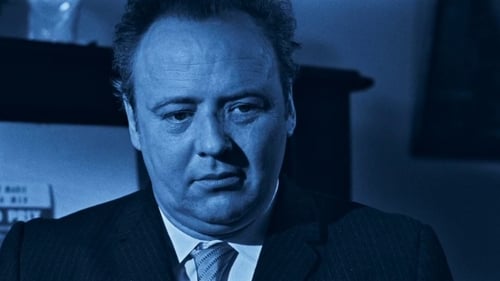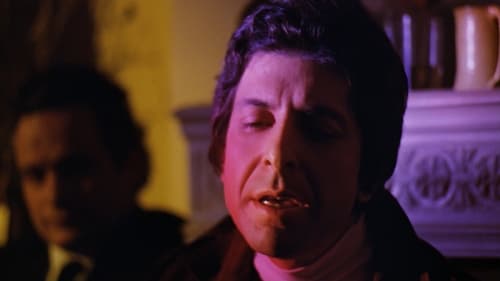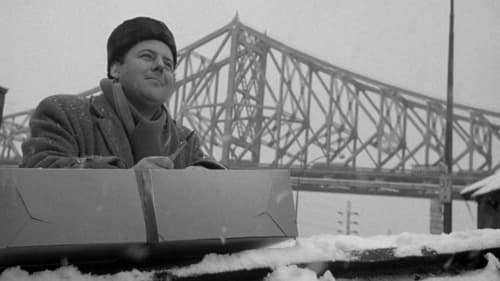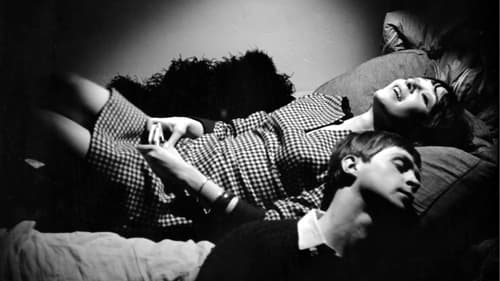Jean-Claude Labrecque
Nascimento : 1938-06-19, Québec City, Québec, Canada
Morte : 2019-05-31

Himself
A genuine encounter with filmmaker Jean-Claude Labrecque, this feature-length doc underscores not only the importance of his work (especially in the documentary medium) but also his passion for film. The bond between Labrecque and director Michel La Veaux allows us to see beyond the images and discover the smaller story hidden within the larger one. La Veaux shares with us his own love for film and the humanistic perspective from which Labrecque has used his camera to etch the great moments of Quebec’s culture and history into Quebecers’ collective memory.

Self
This feature documentary by Jean-Claude Labrecque recounts the bold and astounding enterprise of French filmmaker Julien Duvivier, who shot a film adaptation of Louis Hémon’s classic novel Maria Chapdelaine in Péribonka, a village in Quebec’s Saguenay-Lac-Saint-Jean region, in 1934. What was the impact of the original film’s production on the life of the community? What memories remain? What town secrets lie hidden in those memories?

Director
This feature documentary by Jean-Claude Labrecque recounts the bold and astounding enterprise of French filmmaker Julien Duvivier, who shot a film adaptation of Louis Hémon’s classic novel Maria Chapdelaine in Péribonka, a village in Quebec’s Saguenay-Lac-Saint-Jean region, in 1934. What was the impact of the original film’s production on the life of the community? What memories remain? What town secrets lie hidden in those memories?

Writer

Director

Self
Thanks to the development of techniques and the adventurous spirit of pioneering filmmakers, among whom Michel Brault occupies a central place, a new way of making cinema was born at the turn of the 1950s and 1960s. This film relevantly retraces the history of a collective movement which revolutionized production and filming methods in Quebec and the world.

Writer

Director

Jean-Claude Labrecque
About De Gaulle's eventful visit to Québec in 1967

Director

Editor

Second Unit Director of Photography
When Remy, an ad consultant, falls in love with Sarah, the newest star of an ad campaign, sparks fly. The only problem is that they are both married. Sarah's husband knows she will eventually get tired of Remy while his wife just can't let go. At first she throws him out, begs him to come back, cheats on him, hates him, and finally slumps into the worse depression ever. It is amazing what love can do...

Director

Director
Continuing a saga that began with his previous, 1978 film, Vautours director Jean-Claude Labrecque returns with the French Canadian, Louis Pelletier and puts him in the context of the growing separatist movement in the late 1960s in Quebec. At that time, supporters of an independent Quebec began to consolidate their power under the Parti Québecois -- and the story of Louis and his wife Claudette are meant to illustrate this watershed in Quebec's history. As the film begins, Claudette and Louis are about to get married -- and their wedding day significantly coincides with preparations for the visit of Queen Elizabeth II. Years later, they are well-established in Montreal and are enjoying visits from their family -- and then their lives start to deteriorate. Louis is suddenly out of work, and as he faces the difficulties of finding another job -- and of living precariously -- he becomes more radical, less accepting of the status quo.

Director
Reflections on writing, life and death with French Canadian poet Marie Uguay, who would die of bone cancer shortly after the making of this film.

Director of Photography
This short documentary revisits the 1976 Olympic Marathon. A modern-day addition to the Games, the marathon commemorates the soldier who ran cross-country, in 490 B.C., to announce the Greek victory at Marathon and then died. Here, great film footage of the 1976 Summer Olympics captures the physical demands of the race, while its emotional counterpart is related by Waldemar Cierpinski, the event’s 1976 gold medalist. This emotion-charged film proves that although the winner of the Decathlon is the best all-round athlete, the “toughest” is the winner of the Marathon

Director
This short documentary revisits the 1976 Olympic Marathon. A modern-day addition to the Games, the marathon commemorates the soldier who ran cross-country, in 490 B.C., to announce the Greek victory at Marathon and then died. Here, great film footage of the 1976 Summer Olympics captures the physical demands of the race, while its emotional counterpart is related by Waldemar Cierpinski, the event’s 1976 gold medalist. This emotion-charged film proves that although the winner of the Decathlon is the best all-round athlete, the “toughest” is the winner of the Marathon

Director
Edited from almost 100 km of film footage shot during the Games, this feature documentary is a breathtaking portrait of the 1976 Montreal Olympics. Much more than a simple record of the Games, the film approaches each event with the intention of revealing the athlete - whether winner or loser - as a unique individual.

Director

Director

Editor
Although he is something of a layabout, and is still living with his mother, her death comes as something of a shock to Louis Pelletier (Gilbert Sicotte). Still, he has hopes of some sort of legacy and believes that his relatives will help him find a job. All his hopes are dashed when, before the funeral, his three aunts come to Quebec City to settle their sister's estate. As grasping and efficient a crew as ever strode a parlor, by the time they leave, the estate has been cleaned to the bones, as if by vultures.

Director
Although he is something of a layabout, and is still living with his mother, her death comes as something of a shock to Louis Pelletier (Gilbert Sicotte). Still, he has hopes of some sort of legacy and believes that his relatives will help him find a job. All his hopes are dashed when, before the funeral, his three aunts come to Quebec City to settle their sister's estate. As grasping and efficient a crew as ever strode a parlor, by the time they leave, the estate has been cleaned to the bones, as if by vultures.

Director
A moving documentary about a poet not far from being a legend.

Director of Photography
A pimp and his seven working girls move to a small conservative mining town in northern Quebec to establish a brothel.

Director of Photography
Each married on their side, a teacher and a sociologist meet by chance in Quebec. Political and intellectual discussions followed a brief mad love.

Screenplay
In this French Canadian film, when the provincial government tries to move two young farmers from their land to make way for development, the two fight back, accidentally killing a policeman and becoming outlaws in the process.

Director
In this French Canadian film, when the provincial government tries to move two young farmers from their land to make way for development, the two fight back, accidentally killing a policeman and becoming outlaws in the process.

Director of Photography
In Montréal, Jean-Pierre is fired on the set of a TV commercial where he's an apprentice technician. He's penniless, behind on his rent, with a thin resume and no college units. He has a fiancée, Michelle, but his head is turned by a free-spirited model, from the U.S., who saw him being fired and comes to his flat to apologize. She's Elizabeth, a combination of feckless innocence and sexual freedom. Jean-Pierre borrows money from his outlaw friend, Dock, and buys clothes to impress Elizabeth. Soon he's sleeping with her, and he pulls a theft with Dock to get money to take her to Acapulco. Michelle tries to bring him back to her orbit. Is there a way out for Jean-Pierre?

Director of Photography
A meditation on society's attitudes and beliefs, as explored through a New France fur trapper's relationship with a Native woman that spans centuries.

Director

Director of Photography
This experimental short film deals with anguish, as imagined by Claude Péloquin, author, poet, performer and filmmaker, in the early 1970s. Vertiginous camera angles, oppressive places and a disturbing soundtrack, the filmmaker uses his sound environment and the words of the interpreter Josée Vanasse to express this generalized disease at a time of great acceleration and fury for life.

Director
This is a work share in the impressive filmography of Jean-Claude Labrecque! Crowned a Canadian Film Award (the ancestors of the Genii) Test the miles is almost unrivaled in the history of Quebec cinema. Hallucinated poem to music by Pierre Henry and the text of the Apocalypse of St. John, the film has mystical accents and has an undeniable fascination. We knew Labrecque esthete for 60 cycles, made in 1965, following formal while using a lens with a very long focal length (1000 mm) to film the sun and heat effects on landscapes. Product independently test the thousand has rarely been screened in recent years. Pleased to make it known to our readers is even greater.

Director of Photography
Documentary about Charles Gagnon, Québécois politician, FLQ member and communist leader.

Director of Photography
Filmed for the most part from a low-flying aircraft, this documentary short presents a breathtaking view of Canada from coast to coast. Showing the varied terrain, from craggy coast to towering glacier, the film illustrates Canada’s pristine wilderness as well as today's industrial and urban realities. Canada the Land was specially commissioned for the Canada Pavilion at the Osaka World Fair in 1970.

Director
Filmed for the most part from a low-flying aircraft, this documentary short presents a breathtaking view of Canada from coast to coast. Showing the varied terrain, from craggy coast to towering glacier, the film illustrates Canada’s pristine wilderness as well as today's industrial and urban realities. Canada the Land was specially commissioned for the Canada Pavilion at the Osaka World Fair in 1970.

Director of Photography
This fictional feature follows a twenty-something man who is struggling to define his position in the world in early adulthood. He has left their parents' home but still has not made an home of his own. Our protagonist’s alienation is palpable; for him life is a game, not because he chooses to make it so, but because he is unable to make anything more of it. But for those who befriend him and eventually turn him loose again, his game is not enough.

Director of Photography
A 23-year-old Canadian wanders aimlessly throughout his wasted life.

Director of Photography
Documents a woman's actual pregnancy; the emotions, the affects on her husband and first-born child, the birth itself via Caesarean section, and her struggle to return to work and a social life, while still being a good mother.

Director

Director of Photography
Four years after Pour la suite du monde (1963), director Pierre Perrault asks Alexis Tremblay if he'll agree to travel with his wife Marie to the country of their ancestors, France. In a montage parallel, we follow them in France and listen to them talking to their friends about it.

Director of Photography
A young singer-songwriter abandons his life in his hometown and moves to the city to make it big. He achieves fame, but it comes at a price.

Director of Photography
The story of two young women who go to the city to work in a dress factory, and who share a room to ease their expenses and their loneliness. The film shows the currents that brought them together and the facets of their natures that first made them seem compatible but eventually drove them apart. Their story reflects, to a degree, the situation of anyone who has ever shared the life of another.

Director of Photography
On your marks. Follow cyclists from 13 countries as they cover 2.400 km of Gaspé countryside in 12 days-a course longer than those of Italy, Belgium or Spain. The long shots of curving landscape and open road are set to a mesmerizing soundtrack in this documentary, and the results are spellbinding.

Director
On your marks. Follow cyclists from 13 countries as they cover 2.400 km of Gaspé countryside in 12 days-a course longer than those of Italy, Belgium or Spain. The long shots of curving landscape and open road are set to a mesmerizing soundtrack in this documentary, and the results are spellbinding.

Director of Photography
On Christmas Eve, snowplow driver Leo races to clear the streets of Montreal and complete his holiday shopping in time for midnight Mass. The feature directorial debut of celebrated filmmaker Gilles Carle (The Death of a Lumberjack), The Merry World of Leopold Z is an offbeat holiday treat that builds to a disarmingly resonant conclusion.

Director of Photography
A film between reality and fiction about a popular singer, played by Joël Denis, idol of that time. He is surrounded by a host of great actors and real and famous characters from the 60s.

Director of Photography
A behind-the-scenes documentary about director Michelangelo Antonioni as he's shooting his segment of The Three Faces, a vehicle for Soraya, the former empress of Persia. Featuring interviews with Monica Vitti, Tonino Guerra and more.

Director of Photography
A young journalist is unhappy with society and contemplates what he can do about it.

Director of Photography
This short documentary shows Canada's top swimmers in training for the 1964 Olympic Games. Under the critical eye of coach Ed Healy, they practice long hours in the gym and in the pool to build strength and stamina.

Director of Photography

Director of Photography
A man struggles with his identity, his life choices, his interracial relationship, and his latent homosexuality. A portrait of some young intellectuals in early sixties Montreal.

Director of Photography

Director of Photography


































